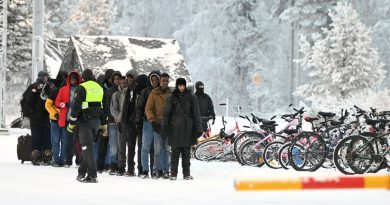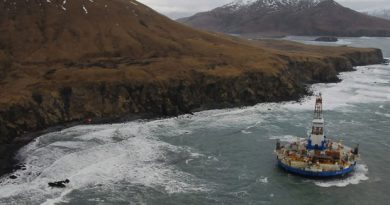U.S. State Department extends continental shelf claims, including in Arctic

Tuesday, the United States grew by a million square kilometers — the equivalent of nearly 60% of Alaska’s land mass.
The State Department enlarged the country’s geography, citing international law, by defining how far under the sea the continental shelf extends. The new additions are spread across seven areas of ocean, and more than half of the claim is in the Arctic.
“America is larger than it was yesterday,” said Mead Treadwell, a former Alaska lieutenant governor and former chair of the U.S. Arctic Research Commission. “It’s not quite the Louisiana Purchase. It’s not quite the purchase of Alaska, but the new area of land and subsurface resources under the land controlled by the United States is two Californias larger.”
State Department project director Brian Van Pay said it took multi-agency fieldwork spanning 20 years for scientists to gather data about the shape of the seafloor and measuring sediment layers.
“Forty missions at sea, going to areas that we’ve never explored before, finding entire seamounts we didn’t even know existed,” Van Pay said. “And, if you add up all the time that our scientists spent at sea, it’s over three years of data collection.”
Announcement despite not ratifying UNCLOS
The State Department says the extended continental shelf claim was made according to the provisions of the 1982 United Nations Convention on the Law of the Sea. The U.S. Senate has never ratified that treaty, but, after 40 years, the government is announcing its continental shelf limits anyway.
Treadwell says it’s a unilateral move, but a solid one.
“If somebody came back and said, ‘Your science is bad,’ I think the United States would listen,” Treadwell said. “But I don’t think science is bad. I think we’ve had very good science.”
The State Department’s recognition of its extended continental shelf in the Arctic doesn’t conflict with a 1990 agreement setting the maritime boundary with Russia.
“None of the fixed points delineating the outer limits of the continental shelf of the United States are located west of the agreed boundary with the Russian Federation,” the State Department said in a summary explaining its announcement.
Overlapping claims with Canada?
Van Pay said Canada is likely to have an overlapping claim but that can be negotiated at a later date.
The U.S. and other countries already claim 200 miles off their coasts as their exclusive economic zones. They exercise rights in these zones over the resources in the seabed and in the waters above.
Tuesday’s declaration of the extended continental shelf, beyond 200 miles from shore, doesn’t include jurisdiction over the water column or fishing rights. Still, it gives the federal government control over the seafloor and any valuable resources that can be mined from it, as well as the right to say who can conduct research or lay pipelines across it.
Some of the areas of ocean the U.S. has claimed as extended continental shelf are in the Atlantic, the Pacific, the Gulf of Mexico and the Mariana Islands. The large section north of Alaska plus a smaller patch in the Bering Sea total nearly the acreage of Texas.
Related stories from around the North:
Greenland: Inuit leaders welcome Canada, Denmark agreement on Arctic island, Eye on the Arctic
Norway: Law of the Sea and International Law is the “Constitution” of the Arctic says Norway’s foreign minister, The Independent Barents Observer
Russia: ‘You cannot claim any more:’ Russia seeks bigger piece of Arctic, The Canadian Press
United States: Alaska senator makes new push to get Law of the Sea ratified, Eye on the Arctic



